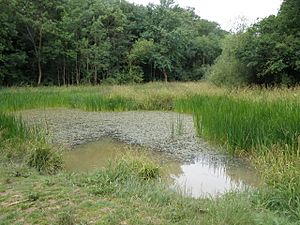Aversley Wood facts for kids
| Site of Special Scientific Interest | |
 |
|
| Area of Search | Cambridgeshire |
|---|---|
| Interest | Biological |
| Area | 62.3 hectares (154 acres) |
| Notification | 1983 |
| Location map | Magic Map |
Aversley Wood is a special place in Cambridgeshire, England. It covers about 62.3 hectares, which is like 150 football fields! This amazing woodland is a Site of Special Scientific Interest, or SSSI. This means it is protected because of its unique plants, animals, or geology. The Woodland Trust takes care of Aversley Wood, making sure it stays healthy for everyone.
This important wood is located south-west of a town called Sawtry. It was officially recognized as an SSSI in 1983.
Contents
What Makes Aversley Wood Special?
Aversley Wood is mostly made up of ash and maple trees. These trees grow well in the heavy clay soil found here. A big part of this wood is very old, which is why it has so many different kinds of plants and animals.
Ancient Woodland and Its Life
Ancient woodlands are forests that have been around for a very long time, usually for hundreds of years. Because Aversley Wood is so old, it has a rich variety of life. You can find many different species of plants, often called flora. You can also find many different animals, known as fauna. This makes the wood a great place for nature to thrive.
The Wild Service Tree
One special tree you might find in Aversley Wood is the wild service tree. These trees are not very common. Finding them in a woodland is often a sign that it is an ancient forest. They are like a natural clue that tells us how old and important the wood is.
Clues from the Past: Ridge and Furrow
Another interesting part of Aversley Wood shows signs of human history. There is an area that was probably used for farming a long, long time ago, around the year 1350. You can still see what are called "medieval ridge and furrow" patterns on the ground.
What is Ridge and Furrow?
Ridge and furrow are wavy patterns in the land. They were created by old farming methods where farmers would plow the land in strips. The "ridges" are the higher parts, and the "furrows" are the lower parts. Seeing these patterns in Aversley Wood tells us about how people used the land centuries ago.
Visiting Aversley Wood
If you want to explore this amazing natural area, you can access Aversley Wood from Bullock Road. It is a wonderful place to learn about nature and history.
 | James B. Knighten |
 | Azellia White |
 | Willa Brown |

